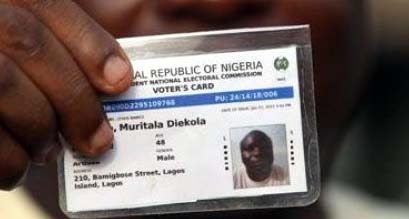Go For Your PVC And Vote By Adewale Kupoluyi
Articles/Opinion, Latest Headlines Saturday, February 21st, 2015
Now that the Independent National Electoral Commission (INEC) has extended the deadline for the collection of the Permanent Voter Cards (PVCs) to March 8, it is expected that Nigerians, who have not collected their cards should avail themselves of the opportunity to do so without further delay and vote when the time comes.
Certainly, the production and distribution of the PVCs mark a key moment in the nation’s attempt at enthroning a system of credible elections. Unfortunately, with the untidiness in the PVCs distribution in many states across the country, there are genuine concerns about the capacity of the INEC to hold flawless elections. According to the latest figures released by the umpire, the total number of registered voters is, 68,833,476. The number of voters who have collected their PVCs stands at 52,233,396, meaning that the percentage of cards collected amounted to about 76 percent. The statistics further show that Zamfara, with 1,495,717 registered voters, had the highest level of PVCs distribution of 1,458,519 or 97.51 percent performance while Nasarawa state follows with 96.29 percent, having distributed 1,196,583 PVCs as against 1,242,667 registered voters. Ogun State recorded the least number of distributed PVCs of 747,556, representing 40.86 per cent of 1,829,534 registered voters in the state. Lagos State has the highest number of registered voters of 5,905,852, having attained 62.40 per cent as it had distributed 3,685,322 PVCs. The Chairman of INEC, Professor Attahiru Jega, also revealed that one million PVCs had yet to be received from the manufacturers.
No doubt, elections serve as a veritable platform to institute leadership under a democratic rule. It is the only legally-acceptable means of enthroning civil rule. Therefore, INEC should ensure that more efforts are put in place to get the cards to their owners since this is the only way they can vote in the forthcoming elections. Despite efforts to ensure that no voter is disenfranchised, many PVCs remain uncollected. Admittedly, the method of collecting the cards could be responsible making the process unnecessarily burdensome, discouraging, clumsy and herculean. Hence, INEC should devise other creative means of ensuring that people not only get their cards but also participate in the elections. It would be unfortunate if with the kind of supporters and crowds seen at campaign rallies, voter apathy sets in as a result of logistic problems caused by the inability of voters to obtain their cards and this may call the credibility of the polls to question. While acknowledging that there have been problems in the process of distributing PVCs, there has been an increasing fear of the likelihood of violence occurring during the elections and the migration of people, many of which were displaced as a result of insecurity caused by the Boko Haram crisis in the north. It is only hoped that the Federal Government would be able to truly manage the crisis before the six-week extension period lapses and elections begin.
INEC should ensure that the abnormalities associated with the PVC administration is addressed once and for all. For instance, INEC officials are not always on ground to attend to people when they come and in most cases, they wait endlessly for several hours. In some instances, they close before the official time set aside for the collection. INEC should ensure that its personnel are fully on ground and even cover more collection centres before March 8. Cases of PVCs being thrown away have been reported in states like Enugu, where some cards were allegedly found in a dump-site. A few days ago, Governor Ibikunle Amosun of Ogun State also lamented that over 600,000 fake PVCs were uncovered in the state. The governor, who could not hide his disappointment at the slow pace at which the cards were being distributed, alleged that ‘something funny’ was happening in the distribution exercise in the state. Amosu had claimed that about 1.8 million people were initially registered while over 500,000 names were later removed on the basis of double registration, among other irregularities.
And on the controversy surrounding the use of the card reader, it seems many of its critics do not to appreciate the fact that it has enormous advantages; first, once the card is well configured, it can only read the PVCs at the polling unit that it has been configured. Second, it is capable of reading the embedded chip card and not the back code. Thirdly, it enables the authentication of the voter’s identity by matching his or her fingerprint with the code on the chip of the card. Four, it keeps a tally of all cards read and authenticated with necessary details including the time when this was done and fifthly, it can be used as a means of identification just like what is obtainable in Mexico, where the voting card is used as a form of national identity.
Certainly, democracy is incomplete without the active participation of the majority of the people. Collecting the PVCs is one thing, coming out to cast our votes is another ball game entirely. That is why everybody should be actively involved in the electoral process. Voter apathy has been a recurring decimal since the beginning of the current democratic experiment. We recall that during the 2011 general elections, only 35 percent of the over 70 million registered voters actually participated in the elections. In addition to the existing collection strategies, INEC should use bulk text messages in reaching out to millions of people. This will inform the people the exact location to go to collect their cards because of the frequent case of venue mix-up. In places like Canada, electorate do not face the problems of having to physically collecting their voter cards as they could easily get them through the post office. INEC and the law enforcement agents should also investigate the allegation that the cards were being purchased by politicians. Those found culpable should be punished in line with the Electoral Act 2010 (As amended).
However, to further ease the collection process and ensure that no potential voter misses this opportunity, both the Federal Government and states with low collection rates should declare more work-free days to allow public servants and other working class more time to obtain their PVCs. As earlier said, there can never be credible elections without the majority of the eligible voters participating. We can still make it for it is not too late to embark on aggressive publicity and enlightenment campaign to ensure that voter’s interest in the entire process is rekindled. If there’s any value the six-week postponement has added to our electoral process, it is to ensure that more eligible voters collect their PVCs and vote.
Kupoluyi writes from Federal University of Agriculture, Abeokuta (FUNAAB), adewalekupoluyi@yahoo.co.uk, @AdewaleKupoluyi, www.adewalekupoluyi.blogspot.com
Related Posts
Short URL: https://www.africanexaminer.com/?p=22354






















